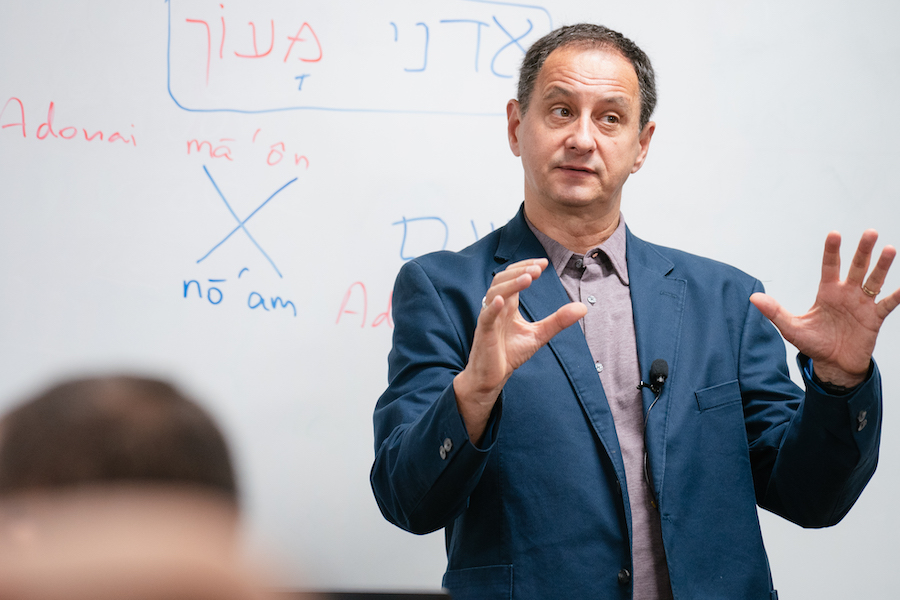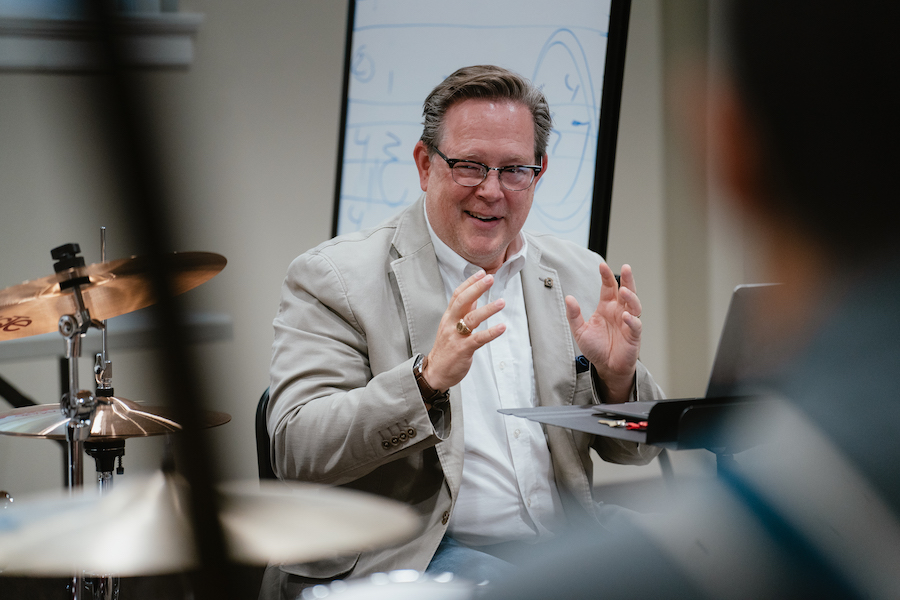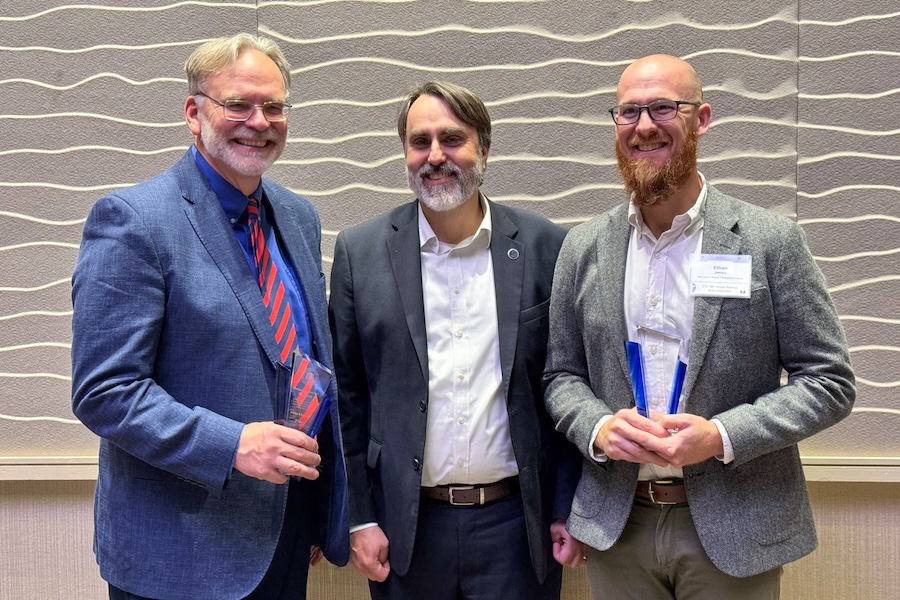A conversation about ‘Baptists and the Bible,’ 40 years later

Critics of the Southern Baptist Convention’s Conservative Resurgence accused conservatives of holding contemporary Baptists to standards of belief not held by their forebearers. Against that argument in 1980, Tom J. Nettles and L. Russ Bush—alumni of Southwestern Baptist Theological Seminary who were then serving on the school’s faculty—published a comprehensive history of the doctrine of inerrancy in Baptist life. The evidence presented in Baptists and the Bible became a major factor in returning the Southern Baptist Convention to its theological home.
For the fall 2020 issue of Southwestern News, Nettles talked with Director of Public Relations James A. Smith Sr. The following appeared on pages 54-57 of the magazine:
1. What is the central thesis of Baptists and the Bible, and why did you and Russ Bush believe that the thesis demanded a book-length treatment of the matter?
- The question that drove Russ and me in deciding to write this book was this: “Is there a prominent presence of the doctrine of biblical infallibility and inerrancy in Baptist life—confessions, theological treatises, polemical writings, controversies, sermons, etc.—to the degree that one can claim that the inerrancy of the biblical text is a historic Baptist commitment?” As we conducted our research and reflected together on what we were finding, we developed the simple thesis that “The historical evidence shows that commitments to biblical infallibility and inerrancy, specifically of the immediately inspired autographs, have been prominent in Baptist life from its modern development in 17th-century England and America until the present.”
2. How did the thesis counter what may have been the generally accepted scholarly viewpoint at the time?
- We developed the question gradually as a result of the theological disturbance happening during our own college and seminary education. This was the time immediately following the Elliott Controversy concerning his book The Message of Genesis and debates over the 1963 Baptist Faith and Message. W.A. Criswell’s book Why I Preach the Bible is Literally True, a symposium by Southern Baptist professors and pastors entitled “Is the Bible a Human Book?,” along with William Hull’s article in the Baptist Program entitled “Shall We Call the Bible Infallible?” and other books and publications about that issue demonstrated the divided state of affairs in the Convention. The general professorial statements concerning this looked upon inerrancy as a rationalistic development of the mid- to late-19th century. It involved a rigid commitment to the text that ignored moral progression, obvious discrepancies, a developmental understanding of God, and was far from the Baptist view of liberty of conscience and the right of private interpretation. Conservatives in the Convention, so the narrative went, were borrowing from the scholastic theology of Old Princeton and were forsaking the historic experientialism and non-creedal genius of the Baptist spirit. We did not see how Baptists as “People of the Book” could have survived without a vigorous commitment to the inspiration of the text of Scripture that necessarily implied its infallibility. During both our M.Div. work and our Ph.D. time of study, we revisited this question many times and, consequently, decided the only way to answer the question was to see if Baptists had indeed spoken to this issue historically—in any number of contexts—and what their commitment had been in these situations.
3. Baptists and the Bible was first published in 1980 in the early stages of what would come to be known as the Conservative Resurgence of the Southern Baptist Convention, although concerns about the Convention’s commitment to a high view of Scripture, particularly among some of its seminaries, had been growing for decades before that. What role did you believe the book could play in the SBC debate about the Bible?
- Our first impulse was to answer this question for ourselves. We started working in the summer of 1976. I had finished my dissertation during my first semester of teaching at Southwestern, and after graduation in June, Russ and I began to pursue the project that we had promised to each other for several years. Our manuscript was finished and in the hands of the publishers before we even knew about the plans developing for the SBC meeting in 1979. We only hoped that the book would allow us and others who would take the research seriously to speak with credibility concerning Baptists and their historic commitment to inerrancy. That the book actually fit a specific need in the efforts of the Conservative Resurgence was as surprising as it was pleasing to us.
4. How would you evaluate the impact of the book in the SBC and beyond?
- We were able to use the book in classes—philosophy for Russ and Baptist history for me—and see its beneficial impact on students. Sometimes we heard from pastors who had read it and were positively impacted by it. Others, of course, liked neither our research, our conclusions, nor the attempt to produce such a study. The book’s influence did not have a short life and became a part of an increasing body of work among evangelicals on this issue. John Woodbridge used it for citation in his 1982 book Biblical Authority for evidence, contra Rogers and McKim, that the concept of the inerrancy of the autographs was not a late development in Protestant thought. Shorter books on the subject used evidence cited in Baptists and the Bible.
5. Forty years after the book was first published, how would you say developments in SBC life since then have validated the importance of the Bible for the denomination and churches?
- The presence today of straightforward commitment to inerrancy—and all its collateral doctrines—in Baptist agencies, institutions, seminaries, churches, and even state Baptist colleges, I believe, demonstrates the denomination is in a healthy state. These decades have produced a united effort to speak to the issue of biblical authority in Baptist life. Important works written and edited by David S. Dockery, Timothy George, Rick Melick, David L. Allen, and others fleshed out the implications of inerrancy. They produced relevant material on hermeneutics, answering questions about critical scholarship, investigating the actual phenomena of Scripture on the issue of its consistency and practical outworking of such a commitment in homiletics. Our book, though it sought to treat some of these issues, seemed to give confidence that a belief in inerrancy was germane to Baptist ministry and witness from its origin and was not imported from un- or anti-Baptist sources. Every generation has to study, find conscientious commitment to, and reaffirm the doctrine of inerrancy. If it is taken for granted and is not celebrated as an element of God’s gracious redemptive revelation to us sinners, we will find eroding influences from other worldviews manipulating our minds to compromise the necessity of affirming the full truthfulness of the biblical text. Christianity involves a beautiful symmetrical combination of observable historical events and the revealed historical narrative and interpretation of the meaning of those events. Inerrancy forsaken will mean Christianity redefined. Modernism among Baptist pastors and professors meant the loss of an inspired text and the loss of a saving Christ. Those most essential doctrines, so absolutely dependent upon the revelation of their reality from the truth-breathing God, will be re-engineered into systems that carry no power of redeeming truth.
6. You and Russ Bush wrote Baptists and the Bible while members of the faculty of Southwestern Seminary. What does it mean to you for the seminary to have published a 40th anniversary edition of the book by its own publishing arm, Seminary Hill Press?
- I remember when Moody Press presented Russ and me each with a leather-bound volume of the first printing of the first edition in chapel in spring 1980. The students showed a very humbling appreciation for the volume during that chapel. The bookstore sponsored a signing event after chapel. That Moody Press published the first edition shows that there was some degree of hesitancy about the volume among the Baptist leadership at the time, and some colleagues were a bit nonplussed. Now, to have the seminary itself publish the volume is a point of deep gratitude for the grace of God’s providence in granting to the academic fraternity of Southern Baptists a receptive and even celebratory attitude toward the historic doctrine that we tried to highlight in Baptists and the Bible.
7. One year after Baptists and the Bible was published, you accepted an offer to teach at Mid-America Seminary, and would later teach at Trinity Evangelical Divinity School and Southern Seminary during a distinguished academic career. In December, you will be teaching as a visiting professor at Southwestern Seminary. Nearly 40 years after departing Seminary Hill as a faculty member, what does it mean to you to be again teaching at Southwestern Seminary?
- I do not know what my emotions will be as I enter the classroom in December. I know that one will be a rich mixture of gratitude and wonder. That President Greenway has invited me to renew my relationship with the seminary in this way shows the depth of his empathy and his spirit of friendship. It also is a testimony to his commitment to an error-free Bible as a book of redeeming truth. I do remember the almost uncontrollable exuberance I experienced after my first class in Church History in January 1976. I ran up the stairs (I could do that then) and went into Leon McBeth’s office and made some exclamation of the thrill of teaching. He said something to the effect of “If you sustain that kind of pleasure in this calling, you will be a happy and a useful man.” I know that I have been happy and will find a renewed spiritual happiness in the opportunity given me to be back on the campus in a Southwestern classroom.
8. You’re also a two-time alumnus of Southwestern Seminary and scholar in Baptist history. What does it mean to you to be among the more than 46,000 graduates of a school with such a storied history in Baptist life?
- The first contact I remember having with Southwestern Seminary was in reading Right or Wrong by T.B. Maston when I was in high school. It had a serious impact on my thinking, especially his insistence that well-formed principles from Scripture were necessary for ethical decision-making. Friends from college decided to go to Southwestern, for it was seen as the best evangelical option at that time among the seminaries. I followed them and moved with my wife of one month to 1724-A Seminary Drive in August 1968. The first class I had at Southwestern was Biblical Backgrounds under William Tolar. It was phenomenal on the very first day. That same semester, I had Greek under Tom Urrey, evangelism under Roy Fish, and missions under Cal Guy, plus a speed-reading course! The next semester, I made a “C” in Anabaptist History under W.R. Estep. He became my major professor in the Ph.D. program. The “Barnes-Baker” tradition was alive and well in Baptist history and was confirmed and complemented admirably by Estep and McBeth. Robert A. Baker, William R. Estep, and Leon McBeth were my colleagues in the history department when I began to teach. Huber Drumwright was the dean of the School of Theology. The heavy focus on primary source research learned within that context informed my orientation toward teaching and writing. There is no doubt that in those days, Southwestern Seminary was the place for me. I was marked indelibly for the good by all those relationships and by the insistence on thoroughness and integrity in research. Added to these are the classmates who became missionaries and pastors, and then the students whose lives were such profound witnesses to the grace of God and devotion to the call to ministry. Being a part of that great army of called men and women provides a witness to me that Christ is ever about fulfilling the promise of building His church.
9. Please name one figure in Baptist history whom you believe has not received appropriate scholarly attention, and briefly explain why.
- I believe J.B. Gambrell and Richard Fuller deserve more attention in Baptist studies. Richard Fuller’s preaching could be mined by homiletics students on a number of issues. His exegetical foundation for sermon production, his organization of sermons, his rhetorical skills, and the doctrinal content of his sermons could all be examined profitably. J.B. Gambrell was editor of two Baptist papers, The Baptist Record and The Baptist Standard, leaving multitudes of editorials rich in folk wisdom and theological reflection. He was president of Mercer University and served with the Baptist General Convention of Texas and as a professor at Southwestern. He was the president of the SBC who engineered the adoption of the 75 Million Campaign, which he described as “orthodoxy in action.”
